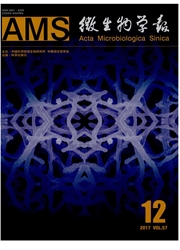

 中文摘要:
中文摘要:
【目的】具溶磷能力的植物内生促生细菌的分离筛选及生物多样性的研究将有助于扩大溶磷微生物来源、丰富功能内生细菌资源库及开发新的改善土壤磷素营养途径。【方法】结合内生细菌分离方法从油菜和玉米体内分离筛选具溶磷能力的内生细菌,测定菌株摇瓶条件下的溶磷能力,并研究其产生吲哚乙酸(IAA)、铁载体、1-氨基环丙烷-1-羧酸(ACC)脱氨酶等的特性,采用16SrDNA限制性酶切片段长度多态性分析(RFLP)研究了具溶磷能力的植物内生促生细菌的遗传多样性,并挑选典型菌株进行了鉴定。【结果】分离筛选到32株具稳定溶磷能力的植物内生细菌,所有菌株都能从磷酸钙中释放出有效磷并使培养液pH值降低,释放的有效磷浓度最高达到537.6mg/L。分离自油菜的供试细菌都能产生吲哚乙酸和铁载体,分离自玉米的供试细菌中有68.4%的菌株产生吲哚乙酸,63.2%的菌株产生铁载体,63.2%的菌株具ACC脱氨酶活性。分离菌株在76%相似性水平上可聚类分为8个群。11株典型菌株归属于泛菌属(Pantoea)、假单胞菌属(Pseudomonas)、伯克霍尔德氏菌属(Burkholderia)、不动杆菌属(Acinetobacter)及罗尔斯顿菌属(Ralstonia)等5个属。【结论】油菜和玉米体内溶磷细菌具有丰富多样的生物学特性和遗传多样性。
 英文摘要:
英文摘要:
[Objective ] We isolated and characterized phosphate-dissolving endophytic bacteria from two commonly cultivated crops. [Methods]Phosphate-dissolving endophytic bacteria were isolated by plating and screening from interior tissues of rape and maize plants on NBRIP medium with tricalcium phosphate as sole phosphate source. Bacteria were characterized regarding characteristics that may be relevant for a beneficial plant-microbe interaction—indoleacetic acid,siderophore and 1-aminocyclopropane-1-carboxylic acid deaminase production,and further classified by restriction analysis of 16S rDNA. Eleven typical strains were identified by 16S rDNA sequence analysis. [Results]Thirty-two phosphate-dissolving endophytic bacteria were isolated from maize and rape plants and classified by restriction analysis of 16S rDNA in 8 different taxonomic groups at the similarity level of 76%. All the isolates could release phosphate from tricalcium phosphate and decrease the pH of the medium. The maximum phosphate content (537. 6 mg /L) in the solution was obtained with strain M1L5. Thirteen isolates isolated from rape produced indoleacetic acid and siderophore,68. 4% and 63. 2% of the strains isolated from maize produced indoleacetic acid and siderophore,respectively. 63. 2% of the strains isolated from maize were able to grow on 1-aminocyclopropane-1-carboxylic acid as the sole nitrogen source. The eleven strains belonged to five different genera including Pantoea、Pseudomonas、Burkholderia、Acinetobacter and Ralstonia. [Conclusions]Phosphate-dissolving endophytic bacteria isolated from rape and maize plants have abundant characteristics relative to promoting plant growth and genetic diversity.
 同期刊论文项目
同期刊论文项目
 同项目期刊论文
同项目期刊论文
 期刊信息
期刊信息
